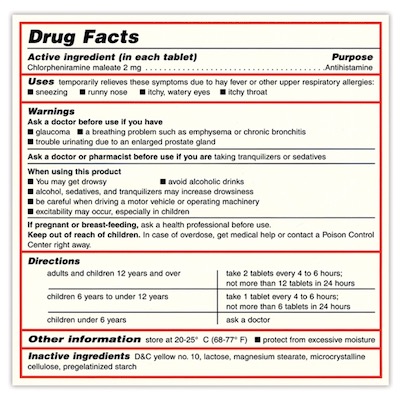Over-the-counter (OTC) medications, such as pain relievers, cough and allergy meds, antibiotic and itch creams, etc., can be safe and effective, but they should still be used with caution. In general, OTC medications aren’t dangerous as long you use them as directed. The primary danger of OTC drugs comes from not having a healthcare provider to help you understand the risks and potential side effects. This puts even more responsibility on you to be informed. Even though you don’t need a prescription for OTC meds, you still need to take them seriously.
OTC medication self-check
What’s the last over-the-counter drug you used?
For that medication, can you answer the following questions?
- What are the side effects?
- Can you drink alcohol with it?
- What foods, drinks, or other meds are dangerous to mix with it?
- Is it safe to drive or use potentially dangerous equipment when taking it?
- Is there any reason or medical condition to not take it?
If you answered “I don’t know” to any of these questions, you might want to pay closer attention to the OTC drugs you use—and take a more deliberate look at the labels. It’s important for your health and performance to know what you put into your body.
What to look for on OTC drug labels
How much time do you spend reading the label before taking an OTC medication?
You’re not alone if you just skim the label to see how much of a medication you’re supposed to take and move on. Occasionally, you might be able to get by doing this, but misusing OTC meds—even if by accident—can have serious and potentially life-threatening effects. By reading labels more thoroughly, you can get more of the information your doctor might have told you—without the cost of a visit.
Since 1999, FDA requires all OTC medication labels to include “Drug Facts” in the same format and order on all labels. Use it to understand the potential risks and side effects the same way you might use the “Nutrition Facts” label on food packages to see the ingredients and the breakdown of calories, fat, sugar, and more.
Here’s a sample label from FDA’s website. As you read it, pay attention to what information you find useful that you might often overlook.
The U.S. Department of Health and Human Services recommends asking your healthcare provider some questions before using a new medicine. (Some of this information you can find by taking the time to read the label of OTC meds. We’ve also noted where to find this info on the label.)
- What condition does this medicine treat? → Uses section
- Should I take it with food or not? Is there anything I shouldn’t eat or drink when taking this medicine? → Warnings section
- What side effects might I expect? What should I do if I have a problem? → Warnings section
- Will this medicine cause problems if I’m taking other medicines? → Warnings section
- Is it safe to drive while taking this medication? → Warnings section
- How many times a day should I take it? At what time(s)? → Directions section
- When should I stop taking the medicine? → Directions section
Bottom line
OTC drug labels are helpful, but they don’t replace the need to talk with your doctor or other healthcare provider about the medications you take—especially if your symptoms continue after a few days. Consult and update your doctor regularly about any OTC meds (and dietary supplements) you’re using. Be sure to let them know if you’ve changed dosages or stopped using any meds, too.
Visit Operation Supplement Safety to get evidence-based information about dietary supplements—and reduce potential risks to your health and career.

